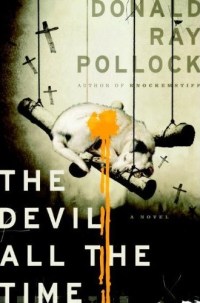The Devil All the Time by Donald Ray Pollock
 Monday, July 18, 2011 at 10:49AM
Monday, July 18, 2011 at 10:49AM 
Published by Doubleday on July 12, 2011
It is rare and wonderful to find a writer who combines the literary sensibility of character-driven fiction with the storytelling ability that shapes the best plot-driven fiction. Donald Ray Pollock is such a writer. I was enthused about the stories collected in his first book, Knockemstiff, and looked forward to reading his first novel. The Devil All the Time did not disappoint.
As was true in Knockemstiff, nearly all the characters in The Devil All the Time are ignorant, violent, and dirt poor. They solve problems with fists and guns. They are driven by sex but empty of love. For the most part, they are beyond redemption, particularly those who claim to serve a higher power. The characters are, at best, drifting through life; at worst, they are consciously evil.
The novel's title appears in nine-year-old Arvin Russell's thoughts: "As far back as he could remember, it seemed that his father had fought the Devil all the time." Willard Russell's battle isn't entirely successful; his intense prayer sessions at an altar of his own making do not shield him from excessive drink or violence. As the novel moves forward, it takes us back in time, gives us a glimpse of the events that shaped Willard's life, then zooms ahead to events that shape Arvin's. The novel detours to other stories: a sheriff and his sister both have homicidal tendencies, as does the sister's twisted husband; a man in a wheelchair and his preacher friend eke out a living in a carnival tent show before they're forced to leave; a clergyman has a taste for young girls. Eventually, as the separate lives weave together, we realize that all these characters are battling the Devil all the time.
A couple of chapters read like the self-contained short stories in Knockemstiff, but they integrate well with the rest of the novel. At times the characters seem too much like the bedeviled losers who populate other bleak novels (clergy members preying on the young is becoming a cliché even if it's never far removed from the headlines), but Pollock's best characters shine with the polish of originality. Pollock's writing is crisp. He includes sufficient detail to develop his characters and to set scenes without slowing the novel's pace.
This isn't a novel for readers who need to like the characters in order to like the book. This isn't a novel for readers who have an aversion to gruesome violence or bizarre sexual practices. For readers who appreciate an intense story filled with sharply drawn characters struggling with lives that seem destined for doom, this is an excellent novel.
RECOMMENDED
Reader Comments